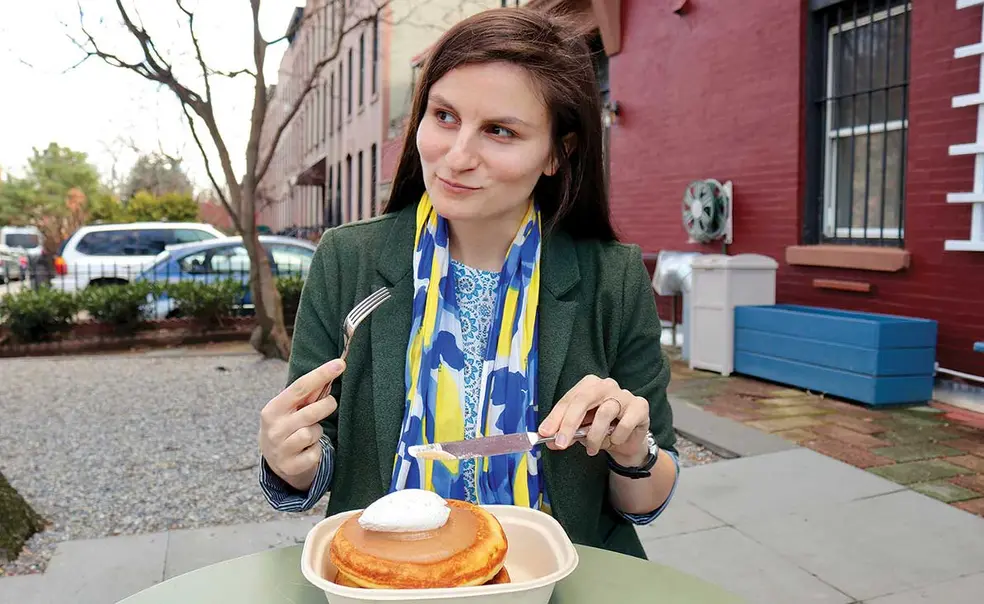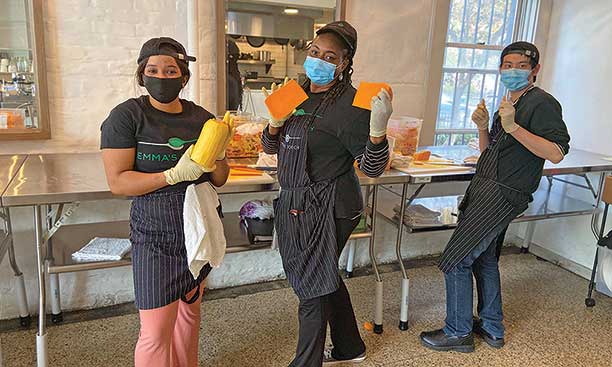Kerry Brodie ’12’s Training Ground for Refugees Forges On
Emma’s Torch, a Brooklyn restaurant, provides paid culinary-arts training to refugees
In early 2020, Emma’s Torch was thriving. The organization, founded by Kerry Brodie ’12 in 2016, provided paid culinary-arts training to refugees, people granted asylum, and survivors of human trafficking. The program had 110 students and alumni and a revenue-generating restaurant, cafe, and catering business in Brooklyn, New York, with plans for expansion. And then COVID-19 arrived.
“The good news is that we were in a very strong position,” Brodie says. “While at the time, it was very, very frightening, we’re fortunate that we’re still around now.”
Emma’s Torch shut down all in-person operations the week of March 17. After the New York stay-at-home order was issued, the organization pivoted to online programming right away.
“A lot of [Emma’s Torch alumni] were losing their jobs, and facing a ton of uncertainty,” Brodie says. According to a New York State Comptroller report, the pandemic caused at least 200,000 restaurant-industry job losses in New York state alone, and restaurant revenues in March 2020 were down 81 percent compared to the previous year.
“While it has certainly been a difficult time, I am motivated and uplifted by the resilience of our students and our community.” — Kerry Brodie ’12
To meet alumni needs, Emma’s Torch held online classes on accessing resources like unemployment benefits and funding grants. The program also continued education for current students through virtual classes on cooking and English language.
The organization resumed some in-person programming in mid-October, when infection levels in New York were low. Current students are given in-person instruction in groups of three in the restaurant’s repurposed dining room, and the restaurant is offering a limited menu for pickup and takeout only. Emma’s Torch has also partnered with Rethink Food, a nonprofit, to provide 600 meals a week to the Nutrition Kitchen food-pantry program. “We’re super excited that we can give back even as we’re also trying to get back on our feet,” Brodie says.
While the nonprofit’s main revenue streams have been shut down, Brodie says it has been able to stay financially afloat: Community partners, foundations, and individual donors “have been really, really helpful in ensuring that we are in a position to reopen and that we are able to weather the storm.”
New York eased restrictions on restaurant operations in the summer and fall, but given that there may be future shutdowns and restrictions, Brodie is looking to other revenue streams. There are plans to develop and produce packaged food products like cooking kits, and the restaurant collaborated with other nonprofits to create holiday gift boxes.
Brodie says that safety is the No. 1 priority. “We don’t plan on having indoor dining for the foreseeable future,” she notes. Going forward, she says, the program will to adapt as needed so it may safely continue.
“While it has certainly been a difficult time, I am motivated and uplifted by the resilience of our students and our community,” Brodie says, adding: “Even when things are difficult, they are a constant reminder of the power of the human spirit, and they give me immense hope for what is possible.”













No responses yet